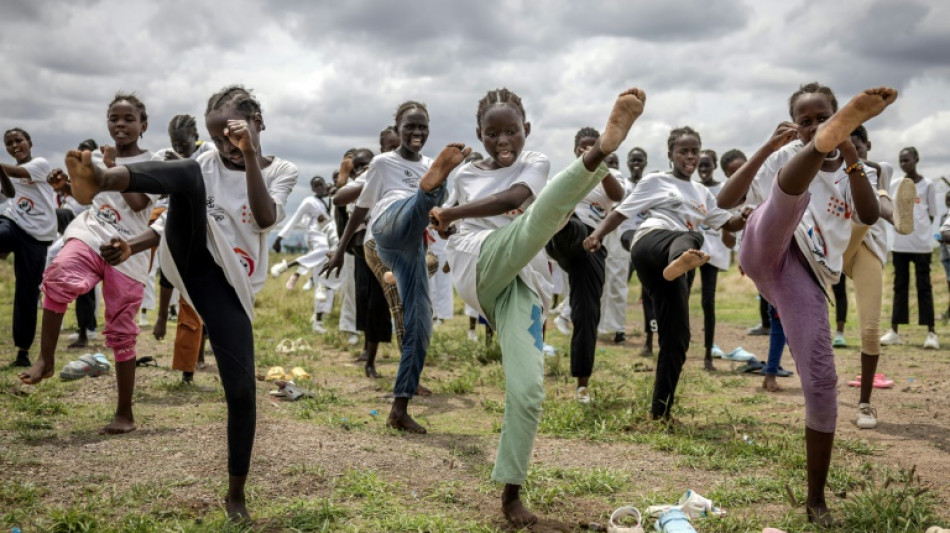

'Defend ourselves': Refugee girls in Kenya find strength in taekwondo
Along one of the many dirt tracks leading into Kenya's Kakuma refugee camp there is a large hidden compound, where inside, twice a week, adolescent girls gather to learn taekwondo, the martial arts lessons offering a safe space in the often chaotic settlement.
Kakuma is Kenya's second-largest refugee camp, home to over 300,000 people -- from South Sudan, Somalia, Uganda and Burundi -- and managed by the Kenyan government and the United Nations High Commissioner for Refugees (UNHCR) since its establishment in 1992.
The camp endured protests last month when rations were reduced after the announcement of the USAID cuts, with President Donald Trump's decision to slash aid funding impacting many within the area.
But the compound -- on the outskirts of the camp proper, down 'New York City' lane -- was calm when AFP visited.
Roughly 80 teenage girls crammed into an open-sided room, their raucous chatter bouncing off the corrugated metal structure.
Fifteen-year-old twins Samia and Salha are among them, Samia explaining they joined because they live in the camp's dangerous Hong Kong district.
"In the past when we were beaten up, we couldn't defend ourselves but now we are able to defend ourselves," Samia told AFP.
Her twin, Salha -- who can neither speak nor hear -- is just as fiery as her sister, their father Ismail Mohamad said with a grin.
The 47-year-old, who fled Burundi 15 years ago, was initially hesitant about letting his daughters join, but the difficulties that Salha faces in the camp changed his mind.
"I thought it would be good if I brought her here so she could defend herself in life," he said.
"Now, I have faith in her because even when she's in the community she no longer gets bullied, she can handle everything on her own."
- 'To protect the community' -
Taekwondo black-belt teacher Caroline Ambani, who travels sporadically from Nairobi, pushes the sport's discipline in each lesson.
Yelling through the chatter, she tried to bring the excitable girls to order: "Here we come to sweat!"
But her affection and pride in her students is evident, particularly girls like Salha.
"Some of these girls have been able to protect themselves from aggressors," she told AFP.
However, the three-year programme, run by the International Rescue Committee and supported by the United Nations Population Fund (UNFPA), is coming to the end of its funding.
Instructors hope the skills they have imparted will be enough to see the girls through the coming years.
One of the captains, 18-year-old Ajok Chol, said she will keep training.
She worries about violence in the camp -- like what she fled in South Sudan aged 14.
"We were so scared about that," she told AFP. "We came here in Kakuma to be in peace."
Now she wants to become an instructor herself, "to teach my fellow girls... to protect the community."
G.Stewart--RTC


